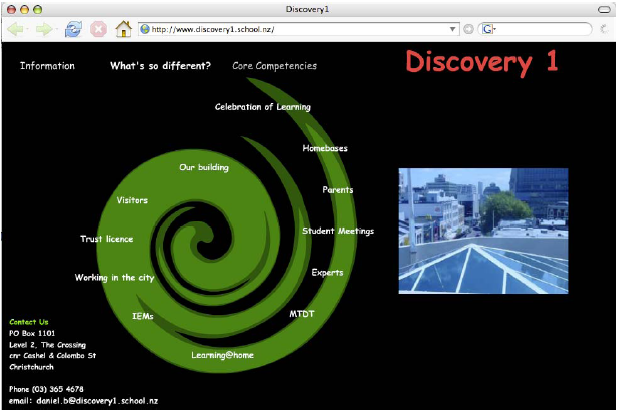Discovery 1, Christchurch
At Discovery1, the intersubjective balance of agency between learners and teachers, has been dramatically changed. Discovery 1 is an innovative state school for learners in Years 1 to 8, located in the heart of the City of Christchurch, New Zealand. Opened in 2001, it takes up several floors of an old office building on the main street, with shops below. The following are extracts from the Discovery 1 website.

D1 seeks to place children at the v. centre of everything we do. We have worked hard to build a school that provides children with the capacity to ‘direct their own learning’.
This is a huge responsibility for students and a wonderful challenge for staff and parents. We have all worked hard to ensure that curriculum expectations are met and exceeded, that children have the capacity to be involved in learning that interests them, that children are supported in their growing skill as self managers, and that learning can be constructed free from the restrictions of place, time, style or subject.
D1 is a learning base. Its placement in the centre of the Christchurch CBD is deliberate. The children and staff have access to many different learning experiences that are not readily available to schools in the suburbs. We have no need for a school library as the Canterbury Public Library is our library, we do not need a school pool as Centennial Pool is our pool. We are incredibly close to parks, museums, art galleries and many other exciting facilities.
Our community opens at 8am and finishes for the day at 5.30pm. Children need to be at D1 by 9.30am and stay through to 3pm.
Children at D1 see the inner city as their classroom. They eat in cafes, exercise in The Square, play in parks, and learn alongside business experts. Our children send a powerful message to the wider community, ‘We are here and we belong’.
Trust licences are available for all Year 6, 7 and 8 children. The Trust Licence gives the children the ability to move out into the city community in groups of three or more. The children that have a Trust Licence have participated in a comprehensive programme of risk management. They are able to demonstrate safety skills within the city, understand how to seek help, can communicate appropriately and are able to practice the core beliefs and values of the school. These children complete a risk management form that contains all the information about the trip that they have planned and are about to embark on. The children take a cell phone with them and call in to say they have arrived at their destination and telephone again as they are leaving to return to D1. This gives the senior students of D1 the opportunity to interact with the community in real and valuable ways and be able to make learning that is personal to the individual or small group a reality.
Learning can happen anywhere and sometimes it is sensible that it happens at home. We offer the opportunity for families to base learning at home. Not everyone uses the learning at home options but it is available if home is the best place to learn on any given day. Some children may decide that they would like to timetable a regular day per week to work from home. Some may do this on a less formal basis. Some children will organise study groups at houses that are supervised by parents. Children are asked to provide evidence of the learning that occurred on the home learning day. Parents are expected to be involved in this recording of learning. Some parents keep in-depth journals of learning, others fill in an evaluation record that we provide.
At D1 we group children in homebases. Each homebase has a learning advisor attached to them. The Homebase is loosely made up of three or more year levels, except for our junior inception homebase. There are approximately 22 children in each homebase.
Some children use structured inquiry processes and others take a more fluid and free approach. We aim that all children experience inquiries that change their lives in some way and in doing so make them richer people within the communities they live in. Some children work on individual inquiries, others work in groups. The inquiries make take a week, month, term or even a year.
Part of the inquiry process that children go through, is to identify and use experts in the field of their passion or interest. We believe children will learn far more from talking with real people than just interacting with books or the web. These experts can be from within the community, or from outside the school. Quite often the children are able to go on a trip to visit and work with this person which can lead to an ongoing relationship with the school.
Individual Education Meetings (I.E.M’s) play a major role in the life of children at D1. This is the process by which the three key stake holders, children, parents and learning advisors, get together at least once a term to formulate learning goals. These goals are then structured into the learning programme for the child and run until the next I.E.M. The meetings can happen as often as required. Children are encouraged to run these meetings so their voice is heard and we honour their input. Our staff have the responsibility of using the I.E.M. to report to parents and children about learning against the National Curriculum and provide input into goal setting to ensure each child’s learning needs are being met. Quality learning portfolios and learning stories provide for samples of work to form the basis of discussions about learning in these important meetings. All three stake holders, staff, children and parents share responsibility for the completion of the agreed goals.
http://www.discovery1.school.nz/
